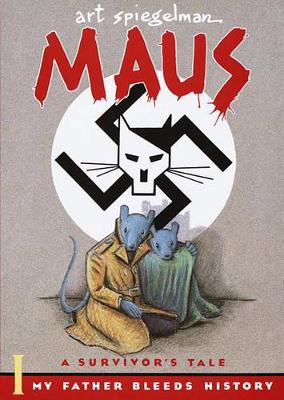Reviewed by leahrosereads on
The book is a story within a story. Art shows himself interviewing his father, Vladek, and his time spent with his father for part of this book, and the rest of the story is Vladek's experiences and survival of Auschwitz and how he survived throughout all of the invasion of Poland by Germany and the Nazis. Both sides shown in this felt completely honest and real.
The art, while definitely not my favorite style, worked incredibly well for this story. There were times where it was just the art in panels, and I really felt like those were some of the stronger panels. The art was black and white, thick lines, and just overall felt really heavy. Most of the time, the panels felt really cramped, but I have a feeling this was intentional.
I absolutely loved Art Spiegelman’s decision to depict the different people within this story as animals (Mice=the Jewish people, Pigs=the Polish people, and Cats=the Germans/Nazis).
Also intentional, and something I really appreciated, was how honest and true to Vladek’s narration Art Spiegelman seemed to stay. In the book, you find out that Art recorded his father’s story, and I think he wrote Vladek’s words verbatim. There were times where the sentence structures were just a little off, and I could hear Vladek's voice so strongly during those times. It just really added another depth to this book.
I wasn’t able to read this in one sitting and I also wasn’t able to pick up another book while taking a break from THE COMPLETE MAUS. But I’m really OK with that. I was able to really digest and contemplate on what I was reading, and I think taking my time helped me understand and fully immerse myself in Vladek’s experiences.
If you decide to read this, just know that it didn’t seem like Vladek held back telling Art anything that he experienced. All the pain and loss that he went through at the hands of the Nazis was extremely haunting to read about.
Vladek’s story will definitely stick with me for the rest of my life.
Reading updates
- Started reading
- 9 February, 2015: Finished reading
- 9 February, 2015: Reviewed
